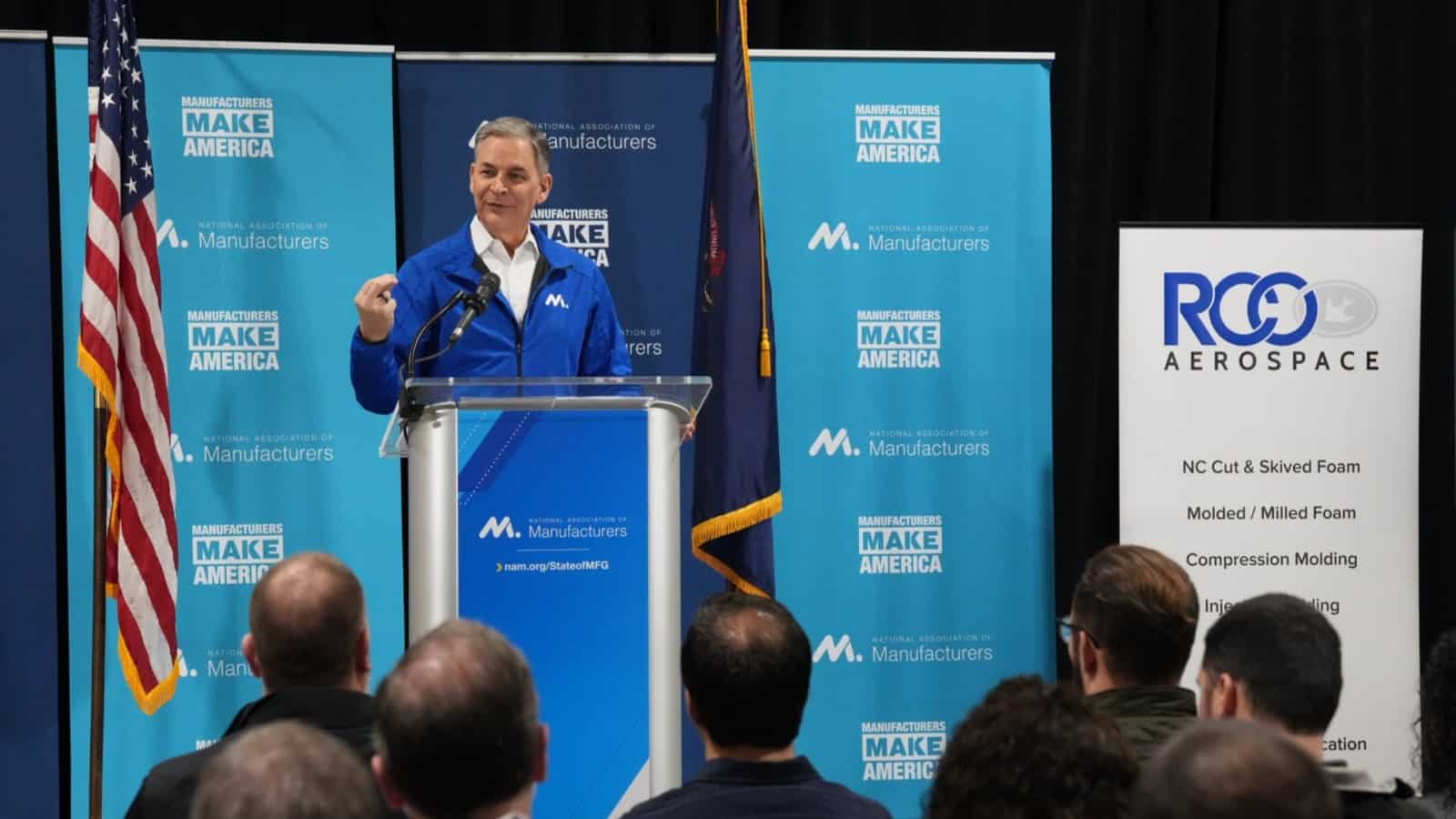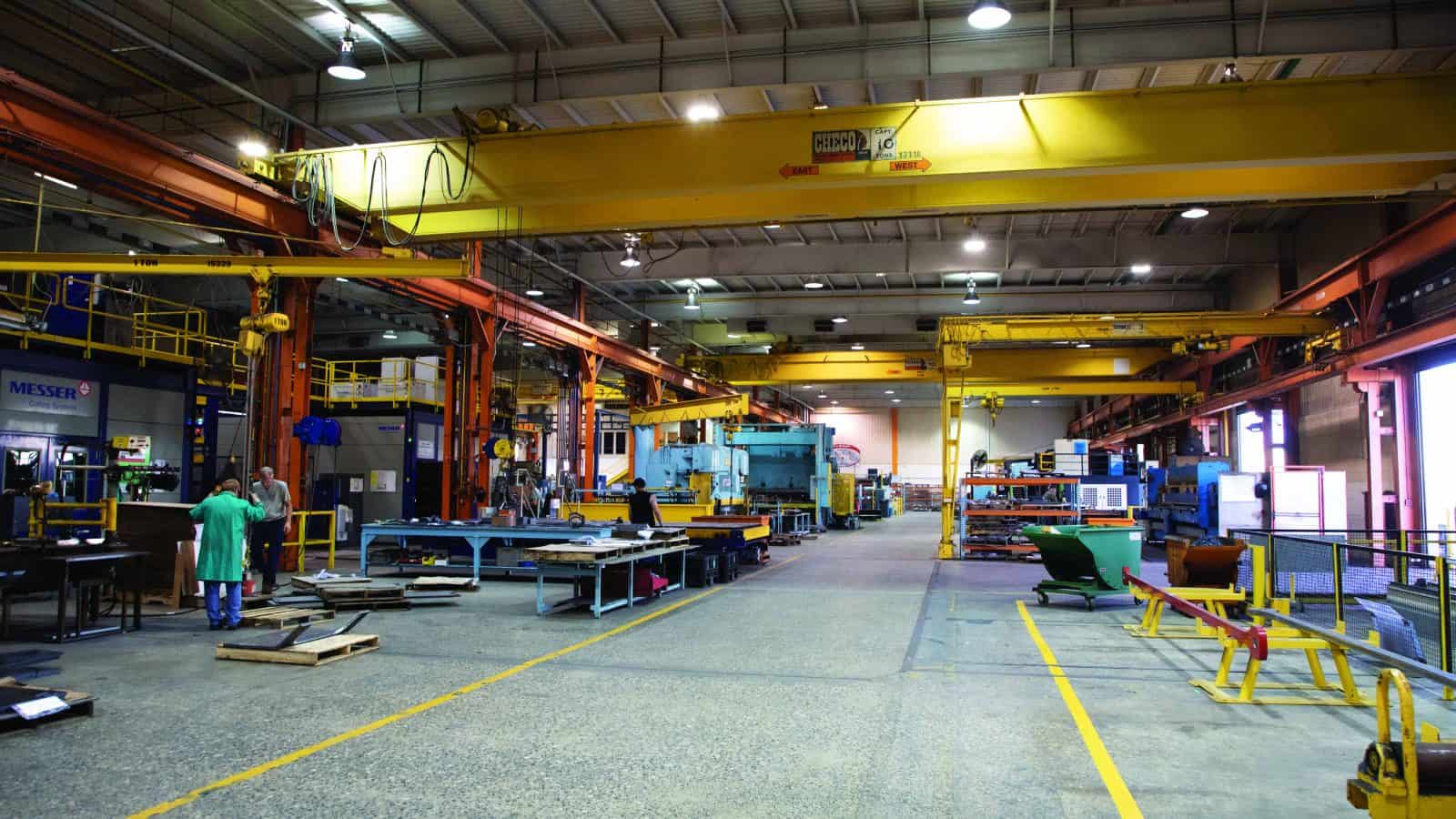State of Manufacturing: Strong, But Not Guaranteed

What’s the state of manufacturing in the U.S.? Strong and resilient—but under threat.
That was the message delivered by NAM President and CEO Jay Timmons and other speakers at the NAM’s 2024 State of Manufacturing Address at RCO Engineering in Roseville, Michigan, on Thursday.
- Attending the address were nearly 100 RCO Engineering team members—some of whom are second- or even third-generation manufacturing workers—as well as local education leaders, including Macomb Community College President James O. Sawyer IV and Macomb Intermediate School District Superintendent Michael R. DeVault.
- The address was the keystone event of this week’s launch of the 2024 Competing to Win Tour, an opportunity to visit local manufacturers and report on where the industry stands at the start of 2024.
A place of strength: “The state of the manufacturing industry depends on the people in it,” Timmons said in remarks covered by POLITICO Influence (subscription). “And we are now 13 million strong—the largest in more than 15 years. If we can continue on this trajectory, this resurgence, imagine what the state of manufacturing might look like in 2030.”
- Johnson & Johnson Executive Vice President and Chief Technical Operations & Risk Officer and NAM Board Chair Kathy Wengel echoed that sentiment in her opening remarks. “Manufacturers are improving the quality of life for everyone. … Together, we can lead the way.”
- And Michigan Manufacturers Association President and CEO John Walsh told the audience at RCO Engineering, “You are making parts here that are going everywhere. It’s a phenomenal story for us in Michigan. It not only helps you as employees here, but it helps your families, it helps your communities. It builds our state. It builds our nation.”
- “Manufacturing … is an industry that is vital to our economic competitiveness,” said Macomb County Executive Mark Hackel. “In Macomb County, we’re not just witnessing the growth of manufacturing; we’re actively contributing to it. What we are doing here is creating an environment where innovation thrives and where manufacturers can grow as well as compete.”
- RCO Engineering General Manager Jeff Simek agreed. “The manufacturing brand is coming back, and it’s coming back alive—and you guys are a big, huge piece of that,” he said to loud applause.
Fork in the road: But continued manufacturing strength isn’t guaranteed, Timmons said. Rather, it’s in large part contingent on sound policy decisions by U.S. leaders.
- “We will head in the wrong direction if Congress lets taxes go up on small businesses when rates expire next year,” Timmons said. “Or if they hit you with even more regulations—regulations even harsher than ones they have in Europe. Or if they fail to solve the immigration crisis because they put politics over good policy. Or choose trade barriers rather than trade agreements, or … abandon our allies overseas and put our national security at risk.”
- The recent regulatory onslaught by federal agencies—which Timmons discussed with Fox Business earlier this week—must stop and be replaced with sensible rulemaking done in cooperation with manufacturers, he said.
- He cited the Environmental Protection Agency’s recently finalized, overly stringent standard for particulate matter and the Biden administration’s decision to freeze liquefied natural gas export permits. This “forc[es] our allies, like Europe and Japan, to buy dirtier energy from countries we can’t trust, potentially enriching the likes of Russia … undercut[ting] our most basic national security objectives,” Timmons said.
No new taxes: The NAM’s message to Congress on taxes is simple: “No new taxes on manufacturers in America,” Timmons said.
- “And while we’re at it, Congress should bring back some of the tax policies that made it easier for manufacturers to invest in the future.”
On immigration: The U.S. needs a common-sense solution to immigration, and it needs it now, Timmons said.
- While manufacturers may not like every piece of the bipartisan border deal that was recently killed in the Senate, “here was my test: Does it make us more secure than we are today? Yes. Does it make our workforce stronger than it is today? Yes. And does it help our allies overseas? Yes,” said Timmons.
Come what may: No matter what the November elections bring, manufacturers will continue to do the jobs so many people depend on them to do, Timmons concluded.
- “Our commitment is to work with anyone, and I truly mean anyone, who will put policy—policy that supports people—ahead of politics, personality or process. We will stand with you if you stand with us in advancing the values that have made America exceptional and keep manufacturing strong.”
